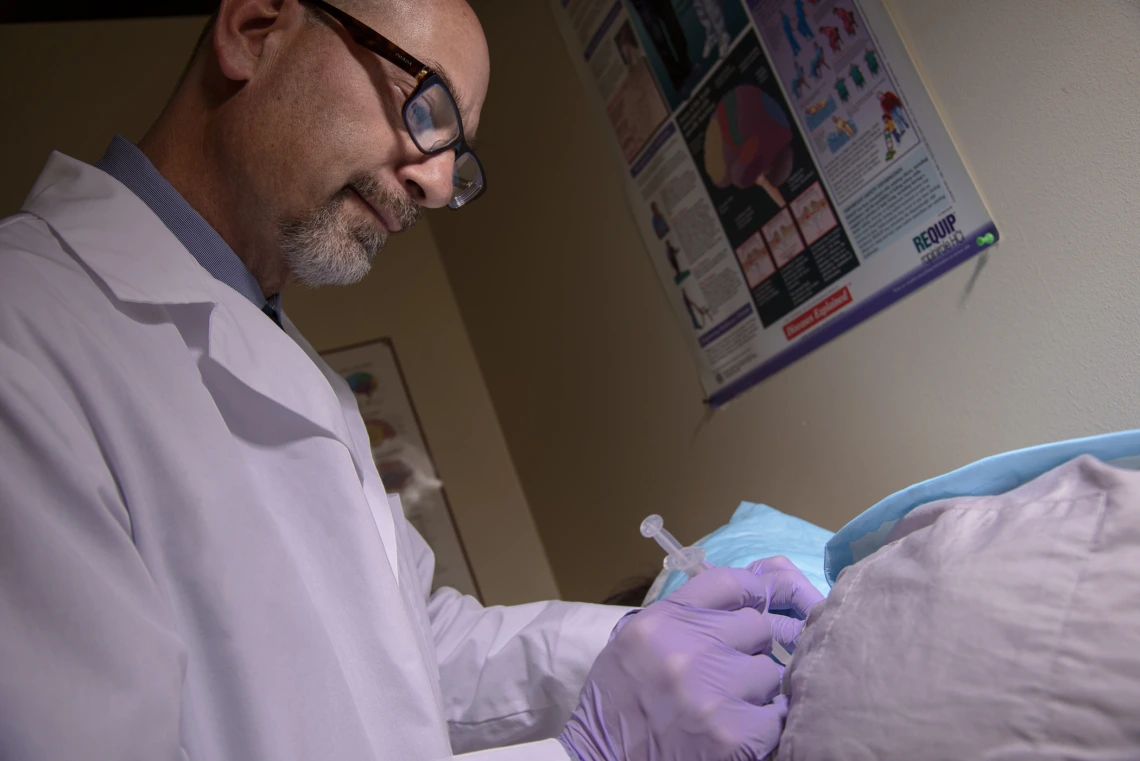Pharma Company Licenses UArizona Method for Treating Parkinson’s Disease with Ketamine
UArizona researchers have developed a method of using ketamine in the treatment of Parkinson’s disease. The discovery has been licensed to Pharmather Inc., for development and commercialization.

Dr. Scott Sherman
Courtesy of College of Medicine - Tucson
TUCSON, Ariz. – Researchers at the University of Arizona College of Medicine – Tucson have developed a method of using ketamine in the treatment of Parkinson's disease. The university has entered into an exclusive licensing agreement with Pharmather Inc., a subsidiary of Newscope Capital Corporation, for the development and commercialization of the method.
Ketamine is a Food and Drug Administration-approved drug, and prior clinical reports suggest that low-dose ketamine infusions are well-tolerated and can help treat pain and depression, which are common in Parkinson's disease patients.

Dr. Torsten Falk
Courtesy of College of Medicine - Tucson
Scott Sherman and Torsten Falk, both associate professors in the College of Medicine – Tucson, worked with the university's technology commercialization office, Tech Launch Arizona, to file a patent application based on the results from preclinical data and five case studies in Parkinson's disease patients. That data indicated that, in addition to reducing pain and depression, low-dose ketamine infusions could also potentially reduce levodopa-induced dyskinesia – an involuntary muscle movement disorder associated with long-term use of the drug levodopa to treat Parkinson's disease.
"We're hoping to see if levodopa-induced dyskinesia in individuals with Parkinson's disease can actually be another disorder that can be treated by ketamine," Falk said. "Our pre-clinical data let us look at ketamine as a reset button; you receive treatment and you have weeks- to months-long benefits. If this is verified by a controlled clinical trial, this accelerated translation and commercialization, due to repurposing a drug with a known safety profile, could benefit patients in Arizona and beyond in the near future."
"We're excited to be working to increase the impact of Drs. Sherman and Falk's work through this new connection with Pharmather and look forward to our ongoing collaboration to continue to bring UArizona research to bear on the problem," said Rakhi Gibbons, director of licensing for Tech Launch Arizona.
Parkinson's disease affects over 1 million people in the United States and more than 7 million people worldwide. There is currently no cure, although some drug combinations are currently used to treat the disease symptoms. Over the past decade, only five new drugs have been FDA approved to manage the symptoms associated with Parkinson's disease.
Pharmather will seek approval to conduct a Phase II clinical study of the UArizona-developed ketamine infusion method this year under the FDA’s Investigational New Drug Program.
"We are very pleased to have an exclusive license agreement in place with the University of Arizona to allow Pharmather to advance the clinical program of ketamine in the treatment of Parkinson's disease, specifically targeting levodopa-induced dyskinesia, a significant clinical unmet need," said Fabio Chianelli, chief executive officer of Pharmather, a specialty life sciences company that was founded with a particular focus on repurposing psychedelic pharmaceuticals such as ketamine and psilocybin for FDA approval to treat disorders of the brain and nervous system.
"With promising results in preclinical models and in Parkinson's disease patients, we aim to expeditiously advance the ketamine program in Parkinson's disease to reduce dyskinesia associated with levodopa therapy with plans for expansion to treat depression and pain associated with Parkinson's disease and other motor disorders that are prevalent in multiple sclerosis, Alzheimer's and Huntington's disease, ultimately creating a unique ketamine franchise," Chianelli said.

